Category Archives for "Birth Confidence Summit"
Interviews and resources to support you to feel more confident about giving birth. Feminist perspectives and paradigm shifting.
Interviews and resources to support you to feel more confident about giving birth. Feminist perspectives and paradigm shifting.
Lecture: Undoing systemic biases and privileges in maternity care starts at 3 minutes 20.
Below are the books that are referenced in the interview including Dr. Amali's own book about her birth experience and how it transformed her, The Heart in The Womb
White Fragility by Robin Diangeld
Witches Midwives and Nurses by Deirdre English and Barbara Ehrenreich
Dr. Amali Lokugamage Bio.
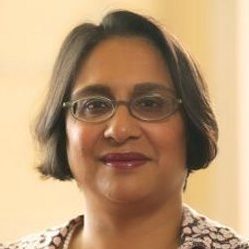
Amali Lokugamage is a Consultant Obstetrician and Gynaecologist and is Deputy Lead of the Clinical and Professional Practice Department of UCL Medical School. She worked on a UCL decolonising the medical curriculum project. Dr Lokugamage is interested in equality, diversity, human rights in healthcare and improving professional behaviours. She has an interest in holistic obstetrics and gynaecology. Dr Lokugamage has written a book called The Heart in the Womb: An Exploration of Human Love and Social Cohesion.
Dr Amali Lokugamage also has a You Tube Channel where you can view more of her work and lectures including, The Costs of institutional births and Mindfulness, Resilience and Panic Attacks as well as her interview with Suzanne Arms embedded below.
Time Stamps
3.20 Undoing systemic biases and privileges in maternity care starts.
Discussing :
7.25 liberating the curriculum. Challenging the Eurocentric, white male dominated curriculum
15.27 Power hierarchies in medicine
21.17 Pedagogical changes including teaching students to detect differing symptoms in different skin tones.
25.33 High profile example: Serena Williams
26.45 Dr Rupa Marya Video clip about woman being nearly missed for having a stroke as Doctors dismissed her pains.
31.10 Cultural Safety
32.20 Unconscious bias training.
33.38 Geographic bias
38.23 Well being agenda and indigenous healing ideas
40.07 Procedures of Limited Clinical Effectiveness - not looking at all evidence only considering NICE.
45.26 Next steps for diversity equality and decolonising health care
51.16 Dr. Amalis experience of becoming a mother.
Natalie's Books and links to studies quoted in the video.
Birth Place Cohort Study :The Birthplace national prospective cohort study: perinatal and maternal outcomes by planned place of birth Birthplace in England research programme.
Perinatal or neonatal mortality among women who intend at the onset of labour to give birth at home compared to women of low obstetrical risk who intend to give birth in hospital- A systematic review and meta-analysis - Hutton Et Al
Natalie's Bio
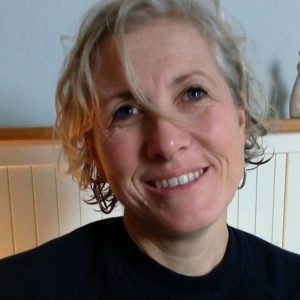
Natalie Meddings is a doula, active birth teacher, mother of three and founder of the mother-matching support site, tellmeagoodbirthstory.com. The site moves around by word of mouth and for eight years now, has kept travelling, from mother to mother to mother - proof of the simple power positive birth stories hold. Ground-up is how Natalie believes women's confidence in birth can grow, from powerful stories, ordinary support - one to one exchanges where one woman simply passes on the things she's learned about childbirth to the next.
Her book How to Have a Baby follows the same path, a practical, hands-on guide to what a woman needs and how she can get that met. Her second book. Why Home Birth Matters is a clear, fact-based conversation on how at a time where birth without intervention is at an all time low, home setting and support can provide women with the best of all possible worlds.
Time Stamps
Currently 2% of women choose home birth. This means 98% say I feel confident about having a baby in hospital ; why when it gives you the worst odds of a normal birth of anywhere? From a consumer perspective women are opting for the hardest place to give birth. The hospital added a level of unpredictability and variables that were not seen when birth was predominantly at home earlier in the century.
7.04 The idea of opting in for medical assistance rather than opting in for home care. In birth women are opting for the strongest' insurance policy' ie the hospital they can find which by default gives them the least chance of the ordinary birth they want.
10.00 They myth that medical staff are insisting on the interventions. The reality is that you run out of road in hospital where you are on the clock and observed which interrupts your natural biology and flow.
14.27 It is cultural confronting idea to the system and strange to us in the public tto not choose to be tracked for example with scans and Vaginal examinations. Once we understand that we can feel progress the brain clicks into place.
16.06 We recognise we can tune into how our child is once they are born but this is already the case in pregnancy. In the hospital a sense of self management and what do I need to do is created and this is a mental process that is impeding the flow of knowing what it feels to follow her bodies cues.
19.15 At home we do not have to manage ourselves and be vigilant and we know the rules and have the power.
The myth that the first time mother doesn't know what to do. Her body does know this is biology and it is primal.
26.00 There is a place for more support for first time mothers. Remember the birth place study confirms that it is very safe for a baby in any setting and Hutton et Al study in August 2019 confirms
29.50 If home gives the best of all possible worlds why do we still go to the hospital- peoples misconceptions fear of media and talk of risk. Looking at making decisions based on prejudice and not evidence.
31.59 Debunking myths of mess, noise and frightening the children if we birth at home. And a look at the fears of danger for the baby such as not breathing when the baby is born and what will really happen. Also what happens if you bleed at home.
39.54 In 1953 most women gave birth at home and 90% of women had no interventions so clearly the question to be asked in the case of intervention is- Would this have happened at home? but no-one is asking it this way round.
41.03 Natalie takes us through a detailed example of a woman who has a home birth that ends in a transfer to demonstrate how birth unfolds and we follow the cues of the body with timely transfer arranged/
50.40 Understanding the biology to see why birth at home works- home ticks all the boxes to help keep you pelvis free and your body and ligaments pliant. How the hormones flow and at 100% in the right setting and this makes birth easier and swifter.
58.00 At home the baby is the torch bearer and we all follow its journey and they come. Everyone is listening to them and following their lead.
1.03 Birthcentres are partly the reason that an increase in home births has stalled. The question to ask of your birth centre is to ask the stats on who stays there to actually give birth. Does London skew the stats?
1.05 How apps are missing the point and can make birth longer as mother has to observe herself rather than going into her feelings. Women move from rest to rest at home and work with the good bits.
1.09 Michel Odent talks of how women in hospital are deprived of the transcendent state of birth. No one is doing this on purpose, but the hospital acts as gatekeeper on accessing deep alternative states of consciousness. It is a privilege and honour to witness life force and what it is capable of.
1.14 Home birth gives the best chance of having a mother and baby in good shape after the birth.
1.17 if you are listening to your body and choose hospital then this is what is right for you which is not the same as going in through fear and not instinct. Find your truth and stick to it.
Quick Links to Resources mentioned in the Interview
BigBirthas: UK Information and support for bigger mums and mums-to-be.
Well Rounded Mamas is the US site that Amber used before setting up her UK site and may be useful for you if you are in the USA.
The BRAIN Acronym to help you make decisions
Amber's Bio

Amber Marshall established BigBirthas.co.uk in 2010 as a source of information and support for high BMI pregnancy, after some poor personal experiences of maternity care.
Almost 10 years of campaigning later, she’s sad to report that high BMI pregnancies still aren’t being treated positively, holistically, and individually, but small improvements here and there are happening. At the very least, the site has helped a group of women feel more confident and vocal about their birth choices, with a thriving community of Big Birthas supporting each other on Facebook. Amber has two children aged 7 and 9 and lives in Birmingham.
Time Stamps
Getting pregnant quickly was the first indication that being overweight may not be as bad as the messages Amber was getting about risks.
The trap of listening to the relative risk without considering the absolute risk.
Remember that the majority of women go on to have healthy pregnancies and births despite the risks.t.
4.00 Big Birthas website focuses on the research and contrasts with how it is reported in the media so you can make an informed decision.
4.24 Refused to fall for the fear-mongering in her second pregnancy and questioned that even though there may be an increased risk, if that risk does not come to pass then why be treated differently?
The irony of high BMI women being monitored and asked to lie on the bed, the opposite of what make birth easier and then blaming the woman's size for poor outcomes.
6.29 Comparing the attitude of a netball coach wanting the best out of her team to maternity systems. What would happen to her netball team if she banged on about what they did wrong last week and what could go wrong in their next match?
10.06 A Canadian study looked at outcomes for high BMI women if we remove confounding factors and found no statistically significant difference.
12.52 Policies can come in due to a theoretical good idea without evidence to back it up such as treating women with Clexane in an attempt to reduce risk of DVT. Ask for evidence.
17.26 When tests are repeated due to not showing a positive result that supports the risk. What is going on there?
22.00 How the way women are treated can affect mental health and result in women removing themselves from the system.
23.56 Debunking the 'fat vagina 'myth that raised its head in a recent interview with Dr Marco Gaudoin, a fertility Doctor on BBC radio Scotland. The theory came from a study in 1997 but there is no evidence to support it.
30.00 How bigger women are portrayed in the media with no heads just torsos or bottoms . And the narrative of blaming and scapegoating.
32.40 Amber's personal journey to two positive birth experiences.
37.14 How it feels to give birth: number 1 Amber felt like a warrior.
40.47 In her second birth Amber felt like a goddess.
46.00 The comparison of how Amber felt and was treated at home and in hospital with hospital feeling like an impersonal conveyor belt where noone remembered her name and at home where the power lay with her and everyone knew her name.
47.26 Amber's vision would see high BMI women treated as the norm and be mindful of risks but not treat differently instead be very positive about the outcomes as there is no reason to be anything else.
48.00 Advice: Do your research and don't expect your doctor to know everything about your personal circumstances and what is best for you. Use BRAINS acronym to help you.
Apologies for some of the sound quality. There were a few connection problems. As a bonus to make up for this I have also included a written interview with Phoebe. Scroll down below the bio to read it and scroll further down to see time stamps for the video interview.
Phoebe Pallotti Bio
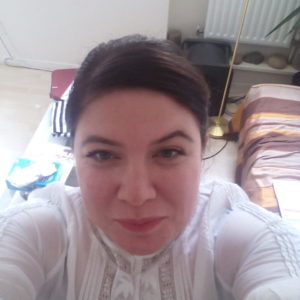
Phoebe is a mother, practising midwife, doula and an Associate Professor of Midwifery, mainly specialising in research on global and local maternal health inequalities. her background is in medical anthropology and she is a passionate feminist. Out of work she plays the piano exceptionally badly, enjoys writing with a bit more skill and likes to cackle anarchically with the people she loves. Read her experiences in Malawi here
Q1. How did your passion for birth begin and what called you to become a midwife?
I was brought up by a very strident second wave feminist, a young single parent, which was not a very easy thing to be in Thatcher's Britain. Social inequality was something that I experienced and observed and I went to University to study Anthropology - essentially the philosophy of people as I have always seen it. During my first undergraduate I became very interested in the anthropology of birth; both different customs and practices but also the social, political and feminist context of birth. I decided to retrain as a midwife because I thought at the time that birth was the last great battle of feminism. It is not. It is the first, and we are still fighting it. Birth is either the cradle of female power, the point of departure when we believe in ourselves and our bodies in a way not constrainable by the patriarchy. Or it is the crucible of woman's oppression - a seminal, powerful and creative moment of our lives denied us as control is stripped away and our own instincts are erased from the conversation. It became my passion to divert the course of the river towards the former, not the latter, though I still have reservations that I have much impact as a researcher in this, despite the feminist underpinnings of my work. We've just founded a Maternity Cooperative based on loosely anarchist and very definite feminist principles in Sheffield. Watch this space, for that one.
Q2. You spent some time in Malawi volunteering as a midwife. What did you learn
from experiencing birth in a different culture? What are some of the highlights of your
international work?
Mostly what I learnt from my time as a midwife in Malawi (I wasn't technically a volunteer, I worked for the governmental NHS like most midwives in Malawi, they just didn't pay me 😉 was that there is no corner of the world in which the colonialist patriarchy has not brutally inserted itself. That said, I was mainly in a University Hospital in the largest city in Malawi, so most of my experiences were in a highly interventionist ward, dictated by colonial intervention in the health system. Maybe things are different in more rural locations - although the maternal mortality in Malawi is high regardless of location of birth so there must still be certain issues. Personally, I loved Malawi (there is a blog about my more general experiences at www.phoebepallotti.com - scroll down to find the Malawi bits) it is a stunning country and I lived in a very gentle community there - coming home was rather jangling to the nerves, thereafter. But my experiences of birth there are always going to be coloured by my work as an international researcher in maternity - I could go on at length about models of delays in care, about the obstetric threshold (whereby women in half the world die for lack of treatment and the other half from over treatment) if this is of interest to you? Women generally at the unit were not heard, their experiences were erased and human rights were thin on the ground - very much like my experiences in the UK in fact. There were some issues with stock outs and particularly for kit in maintaining asepsis (sterility) but generally my colleagues were highly experienced and very skilled. I learnt a lot from them all. One of the biggest challenges was in responding appropriately to a different extended care situation - by this I mean, as an example, saving a baby born in poor condition at all costs is something we would do without thinking here. In Malawi, where ongoing paediatric care is minimal, different axes of decision making need to be applied. This speaks to the wider discourse of modern medical colonialism - effective treatment and strategies need to be developed and led by people who really understand the situation, which is mostly but not always, local women and Malawian staff. Madonna, in penance for her unpopularity due to her rather strong handed adoption of a Malawian boy, gifted an MRI machine to my hospital. Unfortunately, the nearest supply of liquid helium to run the damn thing is 2000 miles away with no appropriate transport mechanism. So really it's just a very expensive bed taking up otherwise useful space. That.
Q3. Your research focuses on global women’s health and safe mother hood
initiatives and you also campaign for safe and dignified maternity care of women
seeking asylum in the UK. What particular issues do you see for women in
marginalised groups that need to be addressed for these women to be confident
giving birth and to have positive experiences?
They are two particularly different issues to me - global women's health demands that we have a representation, a voice, a power within both the strategic planning of maternity services world wide, in maternity research, in local care provision and when we step onto the labour ward. Currently, in my opinion, we are still fighting to be present at all of these levels. For example, a recent bid for some training funds I put in came back with the comment that 'there was no evidence that midwives were capable of doing a PhD'. Where do you even start with that. Each level effects the other and due to the intersectional nature of inequality, women of colour are even less likely to be visible in all of these spheres, as well as women with disabilities, women who's families, gender identities and sexualities do not match up to the expected heteronormative constructs. All we are doing, from researchers, to Birthrights, to Maternity Action and the White Ribbon Alliance, as well as the fierce radical midwives in practice and the women campaigning and bravely sharing their own experiences - this all makes a difference and on we must go.
Women in the UK Immigration system however, have all of the issues above but a particular set of barriers and vulnerabilities set by the way the Home Office treats asylum seekers and refugees. What shocked me most when I began to work for Medical Justice, was not that the Home Office was systemically racist, I knew that already from the experiences of people I love, over the years. What shocked me was just how incompetent they were. Papers were lost, erroneous information was frequently recorded and many of the consultations I reviewed to write medico-legal reports would have seen the nurse or doctor sacked, had they worked for the NHS. I can't be more specific about this without the patients permission but I can tell you stories off the record if you want. Preferably with wine. Mostly, access is an issue, from being dispersed and not knowing how or where to access care, lack of continuity, to language barriers, feeling afraid of being charged for care (often because they are told, often wrongly, that they will be), fear of being deported because the clinician will report them to the home office if their documentation isn't in order (which happens). This is a very specific inequality, entirely created by a racist and misogynistic system. We did, in the end, win the battle to stop the Home Office indefinitely detaining pregnant women in immigration detention prisons, but it was only a first step, there is still so much to be done here.
Q4. What is your vision for the future of birth and motherhood? And what do we
need to do collectively to get there?
My vision is that women and parents will have control over the maternity services they receive in a meaningful way, with human rights being the alpha and omega of care planning and provision. One of my current 'rambles in the key of anarchism' is that I think an industrialised health service, like the NHS, is not fundamentally capable of providing genuinely 'patient centred' care. I love the NHS, I fight for it and value it. As a Dr in Public Health, I know that the NHS is the only thing ameliorating our terrible health outcomes, given the extremely high level of social inequality in the UK - much worse than most other European countries. But I don't think the system, as it currently stands, works well for maternity and birth. So, for example, it is really important to know that the quality of heart surgery you will get in London is roughly the same as the quality in Glasgow - it's unfair and unsafe otherwise. It's really important to concentrate expertise for rare conditions so that clinicians are well experienced and the services are efficient (my daughter had heart surgery in the Freeman, Newcastle, one of only half a dozen paediatric cardiac centres in England. They were beyond amazing and we are so, so grateful). It's also really important to make sure that primary care (GPs) are available and of a good standard in every area (though I'm with Marmot on the fact that they are often not - there are inequalities in care provision, but that is entirely another discussion).
Thus, a standardised, scalable and universal set of health procedures and supplies must be in place for the 60 million or so people in the UK - this is industrialisation. The point is, pregnancy is not an illness - it does not belong to the world of medicine but to the world of family, community, wise elders and the children who will be siblings. Of course women can experience illness in pregnancy, of course there are some risks attached to birth, as there are in many life events, but it is not fundamentally a disease. With the forced cooption of birth into the medical profession (13 million midwives burnt as witches in Europe, left a nice space for the surgeons to step into) and the modernist turn to the industrialisation of all medicine birth has been treated as an illness for a good few centuries and with the push for unit births in the 60s and 70s, now an almost entirely institutionalised one. This has left us with a care system which has been hollowed out of relational support and also care over which women have little control. I loved Better Births (2016), we all did, but a lot of the implementation of a drive towards continuity of care has replaced an intuitive understanding of the real benefit of relational care. This benefit is that a midwife who knows you, cares about you will help you feel safe, will detect any changes that are significant to you, will protect you from the things you don't want because they know you don't want them. Instead what we seem to have is the dismantling of a lot of established community teams to ensure the target that you will be seen in labour by a midwife you have met once is achieved. The drive for 'personalised' care seems really, from a very cynical perspective, to mean considering more data points about you in order to feed you into a more particular part of the machine. We organise inductions of labour in response to staffing, we restrict choices of location of birth because of service needs. What you want really is what you are allowed to have in this system.
So what do we need? We need to reclaim birth as a community, local, grass roots, unscalable (but by sharing practice openly, replicable) care which is right for those women, those parents, those midwives (because we are people, mothers, lovers too) and other birth workers. We need cooperatives and other community organisations, run equally by families and birth workers local action groups, our own space to make our own decisions and share our own skills. Of course we need more respect, more family friendly facilities and more oversight on consent in birth. But really what we need is the power back.
Q5. What would you suggest as a starting point for a woman who is currently
terrified of birth for a multitude of reasons and can’t imagine she will ever feel
confident, that this is a dream for others and not for her?
Find a doula, find an advocate, find a witch, get some back up in because, and I know this from my personal experience giving birth - you cannot fight this alone when you're already in lithotomy (both metaphorical and literal). No one can. We need to stand together at the cradle, not just at the parliament. We are not alone, one of the greatest myths of the patriarchy is that we are.
Q6. In what ways do you see women’s confidence getting undermined and what do
you see as the solution or support for that?
I can't really answer this question in isolation as it's not her 'confidence' which is knocked by the institutionalised, patriarchal system (as above, ad nauseum) but her fundamental belief in her own instincts, in her own body and therefore in her own power as a mother - fathers/other parents also suffer this almost just as acutely. As above, she/they need to understand that the power is theirs and to do that, they need good advocacy, support and love from the outset. Find your team, find your community.
Q7. Do you have any final thoughts or insight that you would love every woman
listening to this interview to take forwards into her life and journey as a mother?
Whatever your birth, whatever your body, whatever you need - believe that your voice should and will be heard.
Time Stamps for Video Interview
Phoebe's interest developed through an lens of feminism and a degree in anthropology. SHe shares a transformational story of a woman who had a very standard birth in hospital but due to achieving what she wanted and feeling in control was very happy.
4.54 First time mothers need a team, a tribe, and partners need support too.
7.00 Everyone needs a witch. Witches were just midwives throughout history, The bad rap is exactly the battle. If we stand up for ourselves we are being subversive and evil not reasonable and confident
Patriarchial system not men we are all part of the system and this is the problem.
Woman bossy and man seen as confident. Pejorative discourse
8.30 Being talked over during a consultant appointment where all questions were addressed to her husband.
12.02 With very few exceptions in small pockets, there isn’t a corner of the world in which medical colonisation has not invaded the space. The concept of the white saviour is troubling and the example of Madonna's gift to the teaching hospital she worked in.
Intersectionality and different levels of power. In some cases even the right to be unseen has been eroded and birth by its nature is hidden.
17.00 The objective of having more medical attendants is good in terms of mortality what are we missing? How much trauma is happening?
Making people feel alone and isolating them is a classic symptom of an oppressive regime making a team even more important.
19.50 Believe that you should be listened to and if you are not that is not your fault. Your opinion intuition and feelings are the important thing, the core of safe birth not the nice fluffy bits on the side.
The problems of industrialisation of care in maternity and the limitations so far of the Better Birth Study.
Refuse to accept system issues as your personal problem.
24.50 Get good evidence - Aims, RCOG, BirthRights.
You have the right to say no.
27.50 How we are conditioned since birth with tiny micro aggressions that favour the man and make it difficult to speak up in birth.
Women are tired and also increasingly angry
The telling use of the word decline when it is really a choice. Women need control over what is happening and should not be put in defensive positions.
36.10 The burden of proof in maternity care rests on you proving the alternative is safe. which is wrong and often ignoring the evidence base. Scientific discourse is seen as proof and women as witchy and not true but the science is not necessarily evidence based. The real truth is it is who has the power.
41.00 Work through peoples assumptions. If she feels it’s a valid reason, it’s a valid reason.
Whatever your birth whatever your body whatever you need. Believe that your voice should and would be heard
Need people with megaphone to help your voice be heard but it should be heard. We need voice and need the power back. I am not asking for too, much just everything.
Quick Links from the interview:
Make Birth Better Website including downloadable cribsheets on all aspects of trauma symptoms, what is birth trauma, the traumatised brain, mindfulness for birth and self care for professionals to name but a few.
The fifth Annual Birth Trauma Conference In London on Wednesday January 22nd
The Birth Trauma Association a charity that supports women who suffer birth trauma – a shorthand term for post-traumatic stress disorder (PTSD) after birth. They also have a closed facebook group for parent support
Rebecca's Bio

Rebecca is a consultant perinatal psychiatrist based in London working with women to support their mental wellness through pregnancy and the postpartum. She has a special expertise in birth trauma.
She believes in working holistically and is likely to prescribe exercise and supplements as well therapy and medication.
Rebecca is the Co Founder of Make Birth Better a national collaborative of parents and professionals working to reduce the life changing impact of physical and psychological birth trauma.
She writes, podcasts and lectures all around the U.K and internationally.
Outside of work Rebecca is a mum, training to be a yoga teacher and an avid reader and traveller.
Instagram @drrebeccamoore
Time Stamps
4.00 The importance of feeling prepared and what factors contribute to not feeling prepared. Antenatal education that includes all the narratives on birth can help women feel more in control and confident.
5.20 The importance of involving partners and having education as a family to be.
Remember to plan for the postnatal period whilst still pregnant as we all have a learning curve to go through once we have a baby.
9.00 Honour what you did do rather than focusing on what you didn't. Reframe your achievements- they don't have to be big things to be significant. e.g. getting up is brilliant.
11.40 The Story of how Make Birth Better came into being from hearing women come back feeling alone with noone asking them about how their births went.. Now it has grown exponentially with enquiries from all around the world.
13.02 Systems that are burnt out themselves and not able to give best care create a vicious circle.
18.00 Be courageous to pluck up the courage to tell someone how you feel and recognise what is going on. We also need to do more to reach out to mums and not put the onus on them to reach out to professionals.
22.00 About the Annual conference on Birth Trauma - this year on 22nd January.Tickets Eventbrite
25.00 What is trauma? This can feel like a big word. If a part of your birth felt overwhelming or out of control then you may be left with knock on effects such as anxiety over protective feelings for your baby and in ability to relax. If these are present continuously or most of the time then seek support - GP or Health visitor is a starting point. Each surgery in the UK should have a perinatal champion. Pick someone you feel safe with
Having healing therapy is helpful to explore what happened and feel in control of your feelings. The birth trauma association has a closed fb group.
31.57 Every word counts This was a powerful social media campaign where women shared words that had impacted them positively or negatively in birth and you can view the video at the page. What came out of this was that very tiny differences to use of language can make powerful difference.
35.00 Poor Maternal effort after 40 + hours of labour and no food or sleep. This is a good illustration of how language can impact. Check if what you have said is what has been understood.
38.00 BRAIN - Acronym for asking the right questions . Use your partner as an advocate and challenge poor care. Do not be afraid to ask questions.
40.38 The importance of kindness and how this can be lost in systems where the staff are burnt out. WE need to look after our amazing front line staff better.
42.53 Rebecca's big vision for the future and why having a big vision is important.
46.39 The cost of solving problems is tiny compared to the costs we are already paying for resultant health problems which is very short sighted.
If you are struggling. reach out and ask for help.
Mars' Bio
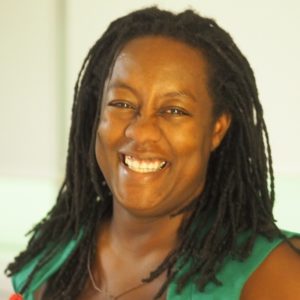
Double award winning doula and birth activist Mars Lord has been a birth keeper for well over a decade. After attending the Paramana Doula course with Michel Odent and Lilliana Lammers, a spark was lit within her and the passion that she discovered for birth and supporting parents has fired her soul ever since. She has had the privilege of working with hundreds of families.
A birth activist, with a desire to see the ‘colouring in of the landscape of birth’ and finding out the reasons for the maternal and neonatal morbidity rates amongst the BAME community, Mars created Abuela Doulas a doula preparation course primarily, but not exclusively, for women of colour. Her desire for reproductive justice led to the creation of the ‘Reproductive Justice Retreat’. Mars was recently recognised in the Mayor of London's Hidden Credits campaign and continues to speak out against cultural safety and reproductive justice.
Facebook - https://www.facebook.com/abueladoula/
Twitter: @Abueladoula
Instagram: @Abueladoula
Time Stamps
Abuela – Spanish for Grandmother as Mars loves to bring Grandmother energy in.
4.14 Among the variety of reasons given for the underlying causes of the disproportionate health outcomes is often an assumption that the black body is faulty and the black woman is stupid. The blaming the black body points to eugenics which says white bodies are superior to black bodies.
Comparing what happened when we discovered that babies born to mothers who smoked were more at risk and an education programme happened and action was taken. Whereas black women are just labelled as faulty.
Looking at reasons why black women access antenatal classes and care later - looking at links to history, including experimenting on female slaves, eugenics and assumptions to challenge.
Looking at the suggestion of economics being a factor as black women statistically have less money.
Summary of the message is that black women are dying because they are too black, too stupid and too poor. This is blaming the victim rather than the system and structure that she has come into.
James Mario Sims ' The father of modern Obstetrics' But who extensively tested on black women without analgesia.
13.49 Drop assumptions and see the human in front of you.
15.30 Looking at what happens when we took our colonial ways and dumped them on developing countries then moved on to kinder methods but look back in horror at what is being done there yet the coloniser started that practice. Plus a look at cultural appropriation of other skills such as baby wearing.
22.51 You may not be the one who set up the system but you are still benefiting from it as it was constructed to benefit white people. WE need to be anti racist not just not racist. Anti racist is active whereas non racist is passive. Get up and call out racism where you see it.
25.07 We know we can do better for all people but watch out for privilege calling out over the voices of black women in spaces where women are gathered to talk about issues facing black women.
Its not pie. We are not wanting to leave you with less.
28.55 Constantly facing daily micro aggressions raises your cortisol levels and you may explode for a minor aggression on the back of many others.
31.00 Look beyond initial defence as a white woman as no-one is accusing you of being a violent racist.
We need to think and look at how differently black women are treated when they wish to home birth or whether they are offered the same length of time to birth in birth centres as white women.
34.00 Historically women's movements have failed black women. The Suffragettes were told to march at the back as this is for all women.
39.44 Watch in spaces where the black woman gets forgotten. #metoo was started by a black woman (Tanana Burke) but this is often forgotten.
What are our priorities? Notice where most outrage and coverage occurs and what this says about our beliefs.
42.11 Advice to pregnant women: Find your black birth keepers find people who understand and know your stories , the ones who know what it is to be black and birth. Remember the mortality rate is incredibly low 40 in 100000 but for white its 8 so get good information. Find good people to follow and learn from and to listen from. If you are not getting the care and support that you expect from your health care professionals or if your midwife or doctor are being racist know that you can change them.
44.00 black labelled as aggressive and threaten to take care and support away from you, white women easier to request change easily many don’t know they can do it but when black it’s a whole other ball game say to pregnant black people find out good black birth keepers reach out to black birthing community and get information and support there who and where you can turn to to give yourself a better understanding of system you are going into lots of us out here. But fe of us given a platform and those who have have to fight to get and keep it in a sea of white experts.
46.30 Vision for the future: That people be valued, listened to and able to give birth with grace and dignity. As simple as that. Collectively raise up the most vulnerable and then the next most vulnerable until we are all healed.
49.45 If you hear something that makes you uncomfortable file that away and deal with it later, Do not throw it back at the person who just said it.
If we listen then we will heal the world.
Enter your text here...
To learn more about The Journey Method by Brandon Bays mentioned in the interview you can download her book The Journey as an ebook for free here and also try Light in the heart of darkness Free yourself from the real causes of depression stress and anxiety by Kevin Billet
Naraya's Bio

Naraya has a plethora of therapeutic, healing & coaching qualifications as well as radically unconventional life experiences, which she uses to embody and exemplify the paramount qualities of pure Self-Love, Forgiveness, Gratitude. She is an Ascension Guide & Wayshower, Blue Ray Wisdom Keeper, and initiatress of 11:11 Global Ascension Pulse Meditation for hUmaNITY. Mother of two adult children, she lives in East Africa, largely removed from conventional systems of society.
Time Stamps:
Naraya takes us back 22 years to tell us the story of her first child when the only thing she knew about birth was what the mainstream was offering including the gynaecology checks and ultrasounds and had no teachings on meditation or about natural birth at all. All went well until Naraya started to feel intuitively something wasn't sitting well with her about the hospital
Naraya changed to a 'Birth House' and did a birth education course with her husband and felt happy with her change of plan as the house was beautiful with slings from the ceiling and a birth pool.
6.54 all was well until her due date came and went. The Birth house was new and under scrutiny and so they were nervous about anything going wrong and at 32 Naraya was already considered old.
9.49 The doctor pulls the 'dead baby card'insisting Naraya should be induced. Instead she asks for the evidence and the doctor scrambles and has no answer.
11.50 Naraya discovers an elderly experienced midwife who has supported 8000 babies to be born and changes her care, then goes into labour the next morning
19.00 Naraya wants women to know this is a natural thing, that nature knows how to do this and our bodies are nature and know how to do this. Naraya suggests we need to ask the question why birth has been taken over and medicalised and how does this dis-empower us.
23.00 Naraya was able to hear her bodies intuition despite having no skills in meditation and even seeing that as some kind of cultist thing at the time.
26.00 Be discerning on what information you take in and your choices.Absorb information on what can go right and our best practice. Tailor your birth to your needs and preferences.Choose your environment to give birth in consciously.
28.46 Have trust and faith in our own capabilities and in God /Creator/Universe - whatever your name for it is, Trust whatever happens is to and for our highest good of our babies and ourselves. Something may not be comfortable to live but may be for our growth and expansion.
35.00 We have choice and choice on what to think in the moment that can give us a sense of power.
37.32 Naraya tells us the story of her second child, an unexpectedly earlier than planned child who was therefore born in a tiny remote mission hospital in Kenya. Naraya has since done much clearing work and forgiveness work on her negative feelings about being pregnant at the wrong time that will have flooded her new baby. (see re to The Journey above)
45.00 During her first pregnancy Naraya spent a lot of time communicating with her body and in her second it was more about connecting with her baby. She asked her baby to come early and start with her waters breaking as the rains were about to start in Kenya.
And her baby listened! This was exactly what happened.
The birth was beautiful and forever linked to the hibiscus flowers her husband brought her to smell as she was in labour.
1hr. Naraya listened to her body which stopped contracting if she lay down and it turned out this may have been she feels due to a slightly shorter cord and needing more gravity to bring baby down. All went well.g.
Naraya would like everyone to have choice and connect to nature. She would like environments of warmth, connection and for all to be listening to the woman's needs in the moment with medical births available for true needs but not default starting point.
Naraya asks us to lift the relentless conditioning that birth is painful and we have been cursed with painful birth ( a mistranslation of the bible as has been discussed in many articles where different people translated the same word differently depending on if they were talking about women in birth or men working in the fields for example.)
If you are feeling disempowered by language as described by Liz in the interview then the AIMS booklet range is super helpful.
It includes Am I allowed?
Liz's Bio

Liz Stanford is the owner of The Calm Birth School, a non-flowery, down to earth, relatable & accessible method of Hypnobirthing which doesn't include ANY vagina whispering. She has over 60 instructors teaching face to face across the UK, Ireland, Switzerland, Philadelphia, and Hong Kong.
Check out the Calm Birth School Hypnobirthing Course here
The Calm Birth School also has an on-line Hypnobirthing Programme available across the world. Liz is a positive birth believer and committed to the work of helping women to create calm & empowered births around the world
Time Stamps
Hypnobirthing was the tool Liz discovered in her first pregnancy that helped her with her fears both of the birth and of the pain relief drugs that she felt she would need. Liz booked her husband and her onto a course and they didn't look back. She then went into her first birth with little of no fear at all.
6.40 Discussing how hypnobirthing tools can be applied to any situation and how they helped with learning to trust her intuition
8.15 Women are more powerful than we give them credit for and growing and birthing a baby.
10.25 Hypnobirthing is a full l antenatal education programme. Including the physiology of birth and what to do to release the right hormones for birth.
14.30 Be supported so you don’t feel on your own or lonely. Bring your partner into the experience and work together as a team
15.30 Liz describes how having the hypnobirthing tools and the support of her partner helped her when she had to transfer from home to hospital. She was able to feel frightened then come back to a calm space.
18.30 How giving birth on the delivery suite with her third was opposite to her original plan but still didn’t deviate from being an empowering experience.
21.00 Hypnobirthing is not just about painfree births but about applying the principles to any situation to make it as positive as possible.
26.00 Hypnobirthing supported Liz with the anxiety she had suffered with all her life and she found the affirmations and mind body connection helped in other areas of her life too.g
28.25 Liz describes the way that language can disempower particularly when she hears women saying 'I'm not allowed' and handing over decisions to someone else.
Women are the key decision makers and need to have confidence to talk to their care givers from the perspective of being on the same level. Use the Brain Acronym
34.00 Knowing if you are done having children or not. Talking to your womb and allowing your womb to release emotions including grief.
36.15 Would like all women to approach birth as something that will transform you and your life and for all the future generations. That in birth you are connecting with your most powerful highest version of you if you can release and let go of fear and embrace the birth.
41.32 Post Natal Depression Liz describes her journey through PND after the birth of her second with whom she had an amazing home birth experience. She started with a mainstream journey, sleeping tablets and antidepressants but when they didn't work Liz took control of her own healing journey and sought out modalities including counselling, CBT Reiki until she became better.
The journey has strengthened her. If she can get through that she can do anything. No mountain is too big to climb.
50.00 Advice to others is get support and don't be scared to try something new and keep trying until you find what works.
Kati is a KG Hypnobirthing Instructor. Check out this previous interview all about hypnobirthing with Heidi Danaher.
Kati Edwards Bio
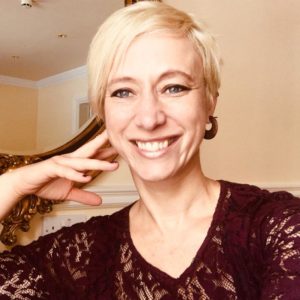
I’m passionate about helping women, like you, prepare for a positive birth experience.
The birth of my 2nd child, featured on BBC1’s; Childbirth All Or Nothing. It’s a landmark documentary for childbirth education and a truly seminal piece of reporting.
I’m also a spoken word artist and created a set of poignant birth poetry. I’ve performed at some of the major conferences including Women’s Right’s in Childbirth, Oslo, Norway, the MAMA Conference, Scotland, The Women’s Voices Conference held at The Royal College of Obstetricians and Gynaecologists, London and the Doula UK Conference, London.
If you’d like to know more about my speaking engagements, spoken word poetry or you’d like to book me for a study day or conference, please click on the highlighted links.
Time Stamps
Kati at first dismissed the suggestion of home birth as not for her. She had grown up with the idea birth was to be feared. Her mother had handed over everything to a charismatic obstetrician to take care of her but did not have a great experience.
As Kati met people on her journey who had different views about birth and began to look at the evidence for iatrogenic harm and she changed her mind to home birth. Key point is to be informed about your options
731 Kati's birth was harder than she imagined and she still managed it. and shares her beautiful Christmas birth story here. In hindsight there were some factors that may have made the birth harder. Including five midwives in the room, an ill husband and her mum helping out- a little over crowded. Not knowing who was going to be her midwife after shift change was stressful and made labour longer/
14.08 Second birth was easier, once she overcame some challenges of not being listened to in pregnancy by her midwife and so changing carers to 121 midwives ( a gold standard caseload midwifery model that is sadly no longer running)This birth was filmed for the BBC.
18.13 Kati chose to film her first birth as she was encouraged by seeing real birth videos of women giving birth calmly but they were all second time mums as no first timers had volunteered.
Second time she got to know producer well so she felt familiar and safe and she stayed in the back ground on the day.
23.33 With her second under 121 midwives she experienced a model of care that didn't do routine Vaginal examinations but used other methods to ascertain how far along she was unless she wanted or needed one. For you communication with your body will let you know if you should choose to have one or not. Know you have a choice.
28.23 Comparing caring for a horse in labour and a human and how you wouldn't move a horse and humans don't want to move to an unfamiliar place either.
30.39 The curse of 'Miss Polite' Experiencing disturbance in the birth space but not wanting to speak up about it. Talk to your 'good girl; in advance and take steps that she won't scupper your plans by being too nice and polite to speak up.
33.00 Do not let someone touch you to appease them even if they are being nice if you don;t want it you can say no. Explain to your partner in advance that this may happen.
35 .00 No is a complete sentence - Quoting Deborah Neiger from Yorkshire Stork Doulas. Let go of cultural obligations and say what you need.
36.43 Knowing your midwife reduces interventions more than any machines. Kati would also like to see more doulas as standard including postnatal care. Kati would like to see better understanding of risk so you can make better decisions . See the BRAIN acronym.
Remember induction is not fool proof and you may not meet your baby quickly it may take days.
4145. With KG hypnobirthing we take women on a journey so they feel calm confident and empowered so birth is safer when women feel like that and not safe when we feel so scared. Find a Postive Birth Movement Group local to you. Don't leave it until last minute.
44.10 Kati describes how it felt giving birth and shares her analogy of getting lost in a whiteout at the top of a mountain whilst snowboarding.
48.21 Birth physiology says we like to feel unobserved and safe and these were the conditions that got me in Kati's second birth.
Kati has a psychology background and feels we should take psychological wellness more seriously which means asking and listening to how women are.
52.01 Say what it is that you need and make own decisions, don’t be coerced into interventions. Do some practice. Surround yourself with positive birth stories as well. . Those who prepare and put in practice tend to have better experiences